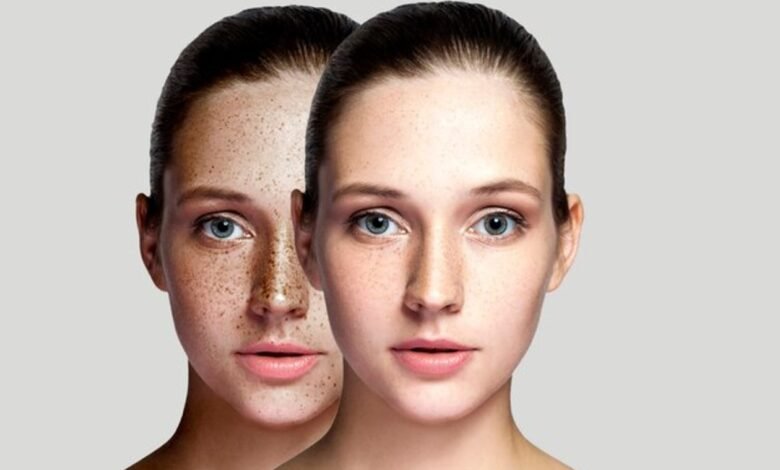What is Skin Pigmentation? Know Perfect Pigmentation Diet

Skin pigmentation is a complex phenomenon central to our skin’s appearance and health. The process is primarily governed by melanin, the pigment responsible for coloring our skin. However, imbalances or irregularities in pigmentation can result in various skin concerns, impacting both the complexion and overall health. Understanding the intricacies of skin pigmentation is crucial for individuals seeking to manage and embrace their skin’s natural diversity. From the causes of pigmentation issues to the different types affecting various skin tones, this article aims to provide a comprehensive exploration of skin pigmentation, shedding light on its significance in skincare and holistic well-being.
Moreover, in addition to understanding skin pigmentation, knowing the significance of a balanced diet in maintaining healthy skin tones is paramount. The perfect pigmentation diet involves an array of nutrients and foods that contribute to fostering balanced pigmentation. By delving into the ideal diet that supports skin health and mitigates pigmentation irregularities, this article aims to offer a detailed guide, empowering individuals to make informed dietary choices to nurture their skin from within and promote a vibrant, even skin tone.
Causes and Types of Skin Pigmentation
- Genetics: Hereditary factors play a significant role in determining an individual’s skin tone and susceptibility to pigmentation problems.
- Sun Exposure: Prolonged exposure to the sun’s harmful UV rays can trigger melanin production, leading to hyperpigmentation, often termed as sunspots or age spots.
- Hormonal Changes: Fluctuations in hormone levels, particularly during pregnancy or due to hormonal therapies, can lead to conditions like melasma or chloasma, causing patches of discoloration.
- Inflammation or Skin Injuries: Scars resulting from acne, burns, or other skin injuries may cause post-inflammatory hyperpigmentation, where the skin develops darkened areas.
Types of Skin Pigmentation
- Hyperpigmentation: This involves the darkening of the skin due to excess melanin production and can include conditions like melasma, sunspots, or freckles.
- Hypopigmentation: This refers to the lightening or loss of skin color, often seen in conditions like vitiligo or post-inflammatory hypopigmentation.
Understanding these causes and types is crucial in determining the most effective treatment and management strategies for skin pigmentation concerns.
Read More: 9 Fish Oil Beauty Hacks to Try for Healthy Skin
Impact on Skin and Overall Health
Irregular skin pigmentation not only affects appearance but can also impact skin health and contribute to psychological distress. It’s essential to understand the implications and work toward balanced pigmentation for overall well-being.
Lifestyle Changes for Healthy Pigmentation
Adopting a holistic approach is crucial for healthy skin. This includes dietary adjustments, regular skincare routines, and lifestyle changes like managing stress and getting adequate sleep.
The Perfect Pigmentation Diet
A balanced diet rich in antioxidants, vitamins, and minerals is crucial for maintaining optimal skin pigmentation. Incorporating foods like berries, leafy greens, fish, and nuts can positively impact skin health.
Best Practices for Skin Pigmentation Care
From using sunscreen to specific skincare products, maintaining a consistent skincare regimen is vital. Additionally, treatments like chemical peels or laser therapy can aid in managing pigmentation issues.
Natural Remedies for Skin Pigmentation
Natural remedies such as aloe vera, lemon juice, and turmeric are believed to help with pigmentation issues. However, their efficacy might vary and should be used cautiously.
Sun Protection and Its Role
Sun exposure significantly influences pigmentation. Using sunscreen with a high SPF, wearing protective clothing, and avoiding peak sun hours are essential for managing pigmentation.
Professional Treatments for Skin Pigmentation
Medical treatments like topical creams, laser therapy, and chemical peels, when administered by professionals, can effectively treat pigmentation problems.
Combating Myths About Pigmentation
Various myths exist about pigmentation, such as applying lemon juice to lighten skin. Debunking these misconceptions is crucial for informed skincare practices.
Pigmentation in Different Skin Types
- Fair Skin: Individuals with fair skin tones are more prone to sun damage and subsequent pigmentation issues due to lower melanin levels, resulting in visible sunspots or freckles.
- Olive or Medium Skin: This skin type tends to tan easily but can also suffer from hyperpigmentation due to sun exposure, hormonal changes, or skin injuries.
- Dark Skin: While individuals with darker skin possess more natural protection against UV damage due to higher melanin levels, they can still experience pigmentation problems like melasma or post-inflammatory hyperpigmentation.
- Very Dark to Black Skin: This skin type generally has higher melanin content, providing significant natural sun protection. However, it’s not immune to pigmentation issues and may experience hyperpigmentation or hypopigmentation.
Understanding how pigmentation concerns manifest in diverse skin types aids in tailoring specific treatments and skincare routines for effective management and care.
Preventive Measures for Pigmentation
Preventing skin pigmentation issues involves consistent sun protection, a healthy diet, and avoiding harsh skincare products.
Balancing Hormones for Skin Health
- Hormonal Imbalances and Skin: Fluctuations in hormone levels, such as estrogen, progesterone, and testosterone, can lead to pigmentation problems. For instance, during pregnancy or while taking birth control pills, increased estrogen can trigger melasma, causing patches of hyperpigmentation.
- Regulating Hormones: Healthy lifestyle choices play a pivotal role in hormone regulation. Adequate sleep, stress management, and a balanced diet rich in essential nutrients can help maintain hormonal balance.
- Diet and Hormonal Health: Consuming a diet with a balance of proteins, healthy fats, and complex carbohydrates positively impacts hormonal balance. Including foods rich in omega-3 fatty acids, such as fish, flaxseeds, and walnuts, aids in hormonal regulation.
- Physical Activity: Regular exercise can contribute to hormonal equilibrium by reducing stress and promoting better sleep patterns.
- Consulting a Healthcare Professional: For individuals experiencing persistent hormonal imbalances that impact skin health, consulting a healthcare professional, such as a dermatologist or endocrinologist, is advisable for personalized guidance and potential treatment options.
By adopting a holistic approach that includes a balanced diet, regular exercise, and stress management, individuals can potentially regulate hormonal imbalances, which in turn may positively influence their skin health and help in managing pigmentation issues.
Maintaining Emotional Well-being with Pigmentation
Addressing the emotional impact of skin pigmentation is essential. Acceptance and embracing skin diversity are key in fostering positive self-image.
Read More: 7 Best Tips for Healthy Skin in 2023
Conclusion
Understanding skin pigmentation and its implications on skin health is essential for a holistic approach to skincare. Skin pigmentation, influenced by various factors like genetics, sun exposure, and hormonal changes, can manifest differently across diverse skin types.
It’s crucial to acknowledge that while pigmentation concerns can affect skin appearance, they also impact overall skin health and emotional well-being. Adopting a balanced approach encompassing lifestyle changes, a healthy diet, and tailored skincare routines is pivotal for managing and maintaining optimal skin pigmentation.
Moreover, embracing the diversity of skin tones and addressing any misconceptions surrounding pigmentation is key to fostering a positive self-image and promoting acceptance of individual skin variations.
Remember, consulting with healthcare professionals, following a consistent skincare regimen, using sun protection, and being mindful of lifestyle choices are valuable steps towards achieving and maintaining healthy skin pigmentation.
FAQs
1. Can skin pigmentation issues be entirely resolved?
Skin pigmentation issues can be managed and improved, but complete resolution may vary based on individual factors and the severity of the condition.
2. Are all pigmentation treatments safe for every skin type?
Not all treatments suit every skin type. It’s crucial to consult a dermatologist for personalized advice before opting for any treatment.
3. How long does it take for natural remedies to show results for pigmentation?
The effectiveness of natural remedies can vary from person to person. Consistency and patience are key while using natural remedies.
4. Can stress impact skin pigmentation?
Yes, stress can contribute to hormonal imbalances, which might influence skin pigmentation. Managing stress can positively impact skin health.
5. Is skin pigmentation only a cosmetic concern?
While skin pigmentation is often viewed as a cosmetic issue, it can also impact overall skin health and emotional well-being.







